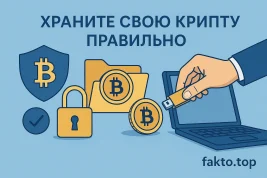How to Keep Your Bitcoin & Crypto Safe
How Not to Lose Your Bitcoins: Essential Tips for Crypto Holders
In the wild world of crypto, security is king. Every day, stories pop up of investors losing their assets due to careless handling or improper storage. This guide will break down how to keep your Bitcoin and other cryptocurrencies safe, avoiding common mistakes. We’ll explore real-life loss cases, estimate the losses in USD, and provide actionable ways to protect your digital assets.

Bitcoin Losses: Real Stories
Crypto users aren’t strangers to heartbreaking losses. Sometimes it’s human error, other times technical glitches. Here are a few notorious examples:
1. James Howells and the Hard Drive (8,000 BTC)
Back in 2013, British IT worker James Howells accidentally threw away a hard drive containing 8,000 BTC. At the time, Bitcoin’s price was much lower, and no one could predict that these coins would eventually be worth hundreds of millions. By 2021, that loss would have equated to roughly $400 million at Bitcoin’s peak price.
2. Gareth James and the Lost USB Stick (200 BTC)
Gareth James, another Brit, lost a USB stick containing 200 BTC. He hadn’t touched it for years and accidentally discarded it with some other junk. The loss at the time was around $10,000, but today, such mistakes could cost you a small fortune.

3. Peter Smith and Wallet Issues
Peter Smith, founder of Blockchain.com, lost some crypto due to outdated software and lost private keys. While the amount wasn’t huge, the incident highlights the importance of regularly updating wallets and maintaining secure backups.
How to Protect Your Crypto
1. Use Hardware Wallets
For long-term storage, hardware wallets are your best friend. They’re offline devices, making them much safer from hackers. Popular options include Ledger Nano S and Trezor. Keeping your coins on a hardware wallet drastically reduces the risk of theft or accidental loss.
2. Backup Your Private Keys
Private keys are literally the keys to your crypto kingdom. Losing them equals losing access to all assets in the wallet. Experts recommend storing backups in multiple locations, preferably in physical form (paper) and encrypted digital copies.
3. Multi-Signature Wallets
Multi-signature wallets add an extra layer of security by requiring multiple approvals for transactions. Even if one key is compromised, your funds remain protected. This is a must for large holdings or shared accounts.

4. Watch Out for Phishing
Phishers are constantly trying to trick users into giving up their keys. Never click suspicious links, and don’t share your private keys with anyone. Think of your keys like the password to Fort Knox—no exceptions.
FAQs: Bitcoin Storage
How long can I leave Bitcoin on an exchange?
Exchanges are convenient but risky. Hacks happen, and you could lose access to your funds. For long-term holding, use hardware or cold wallets disconnected from the internet.
What if I lose access to my wallet?
If you lose your wallet, use your recovery phrase or backup keys. Hardware wallets provide a recovery phrase during setup—keep it safe and offline.
How much Bitcoin should I keep in my wallet?
Depends on your strategy. Beginners might start small to get the hang of it. Long-term holders should spread funds across multiple wallets and stick to reputable platforms.
10 Terrible Tips for Losing Your Crypto
1. Store all private keys in one place
Keep everything in one file or cloud storage for “convenience.” Easy to access, easy to lose!
2. Use a single, weak password
Why bother with complexity? “123456” or “password” works everywhere!
3. Skip 2FA
Two-factor authentication is too much hassle. Let hackers do the work for you!
4. Send crypto to public wallets
Post your addresses on social media for transparency. Surely nobody will steal your coins!
5. Carry your keys on a USB everywhere
Super convenient! Bonus points if you leave it in public or lose it.
6. Skip backups
Who needs them? Devices never fail, right?
7. Use public Wi-Fi for wallet access
Wi-Fi hotspots are perfect for hackers to grab your keys.
8. Don’t verify recipient addresses
Transactions are irreversible anyway—why bother checking?
9. Rely solely on paper wallets
Carry them everywhere! Extra risk, extra fun.
10. Never update your wallet software
Old software is fine! New updates are just overhyped.
Seriously though, don’t follow any of these “tips”. Use hardware wallets, enable 2FA, backup keys, and keep your software updated to protect your crypto.
Cold Storage for Crypto: Your Digital Vault Against Chaos
If you’re still keeping your Bitcoin on an exchange “just for convenience,” you’re basically leaving your Lamborghini parked with the doors open. Cold storage for crypto isn’t just a buzzword — it’s your fortress. Whether it’s a hardware wallet like Ledger or a paper wallet locked in a fireproof safe, this is how to secure Bitcoin like a pro. Cold wallets disconnect your assets from the internet, making it nearly impossible for hackers to breach your stash. Want to protect your crypto assets long-term? Cold storage is the gold standard.
Crypto Wallet Safety Tips: Don’t Be the Next Horror Story
Every week, someone loses their entire portfolio to a phishing link, a weak password, or a forgotten recovery phrase. Don’t be that headline. Follow Bitcoin security best practices: enable 2FA, use multi-signature wallets, and update your software religiously. These crypto wallet safety tips aren’t optional — they’re survival tools. To avoid crypto scams and keep your digital wealth intact, treat your private keys like nuclear launch codes. One slip, and it’s game over. Stay sharp, stay safe, and keep your crypto paranoia level high — it pays off.
Conclusion
Alright, crypto fam — here’s the deal: losing a few Bitcoin because you didn’t back up your keys or got lazy with security is a nightmare you don’t want. Hardware wallets like Ledger or Trezor aren’t just fancy gadgets — they’re your shield against hackers and brain farts.
Multi-signature wallets? Even better — it’s like having a crypto bodyguard squad. And please, keep your software updated; outdated wallets are basically an open invitation for trouble. Stay vigilant, double-check addresses, and never trust sketchy links — your future self (and your portfolio) will thank you.
Stay vigilant with updates and threats in the crypto space. With careful habits, you can protect your assets and avoid the nightmare of losing Bitcoins or other cryptocurrencies.
Disclaimer
This article is for informational purposes only and does not constitute financial or investment advice. Cryptocurrency investments are highly speculative and involve significant risk, including loss of principal. Readers should perform their own research and consult a licensed financial advisor before making any decisions. The author is not responsible for any losses incurred as a result of implementing the suggestions provided.